KING, Jr., MARTIN LUTHER Why We Cant Wait. New York: Harper & Row, [1964-65]. Inscribed by King To Mrs. Montague, In appre... New York: Harper & Row, [1964-65]. Inscribed by King "To Mrs. Montague, In appreciation of all you have done to aid in giving our daughter a good education. Martin Luther King, Jr." Laid-in is also a later Christmas card signed from Yolanda King to Mrs. Jane Montague as well as a letter of provenance. The book a later printing with a "M-P" code to copyright page. Publisher's cloth backed boards, in original dust jacket with the "0664" code and $3.50 price to front flap and text regarding King's 1964 Nobel Peace Prize added under his portrait on the rear panel. 8 3/8 x 5 1/2 inches (21 x 14.5 cm); 178 pp., illustrated with 8 pp. of reproduced photographs. Spotting to boards, edges and jacket extremities, some rubbing to white areas of jacket, crease to jacket flap and at head of spine. A poignant King inscription to the school teacher of his oldest daughter Yolanda - to whom the book is dedicated along with his other children so that "one day soon they will no longer be judged by the color of their skin but by the content of their character" (dedication). Mrs. Jane Montague was Yolanda King's teacher at Spring Street School in Atlanta that, until desegregated by the 1964 Civil Rights Act, had been an entirely white school. Ralph Abernathy, King's close associate, also enrolled his children in the school. Education was a key element in King's Civil Rights strategy, and as he said in a 1964 speech "The walling off of Negroes from equal education is part of the historical design to submerge him in second-class status. Therefore as Negroes have struggled to be free they have had to fight for the opportunity for a decent education." Clearly an important and vulnerable moment for both the Kings and Abernathys, the children's first day at the school was covered in the Herald Tribune ("The enrollment took place without incident") and, despite issues at the school involving race, "of this time [Yolanda] recalls some wonderful teachers who were welcoming and tried to make them comfortable." In his inscription, King is clearly appreciative of Mrs. Montague's efforts towards his daughter but also her commitment to non-discrimination in education rendering this a particularly important and personal association copy of the book. The book has descended within the Montague family and is accompanied by the letter of provenance and a later Christmas card from Yolanda King as mentioned above. For King's quote see his speech of 14 March 1964 upon accepting the John Dewey Award from the United Federation of Teachers; For the coverage on the Spring Street School see the Herald Tribune 31 August 1965; and for Yolanda King's recollections see Smith, Jessie Carney, ed. Notable Black American Women, Book 2, p. 384. C
KING, Jr., MARTIN LUTHER Why We Cant Wait. New York: Harper & Row, [1964-65]. Inscribed by King To Mrs. Montague, In appre... New York: Harper & Row, [1964-65]. Inscribed by King "To Mrs. Montague, In appreciation of all you have done to aid in giving our daughter a good education. Martin Luther King, Jr." Laid-in is also a later Christmas card signed from Yolanda King to Mrs. Jane Montague as well as a letter of provenance. The book a later printing with a "M-P" code to copyright page. Publisher's cloth backed boards, in original dust jacket with the "0664" code and $3.50 price to front flap and text regarding King's 1964 Nobel Peace Prize added under his portrait on the rear panel. 8 3/8 x 5 1/2 inches (21 x 14.5 cm); 178 pp., illustrated with 8 pp. of reproduced photographs. Spotting to boards, edges and jacket extremities, some rubbing to white areas of jacket, crease to jacket flap and at head of spine. A poignant King inscription to the school teacher of his oldest daughter Yolanda - to whom the book is dedicated along with his other children so that "one day soon they will no longer be judged by the color of their skin but by the content of their character" (dedication). Mrs. Jane Montague was Yolanda King's teacher at Spring Street School in Atlanta that, until desegregated by the 1964 Civil Rights Act, had been an entirely white school. Ralph Abernathy, King's close associate, also enrolled his children in the school. Education was a key element in King's Civil Rights strategy, and as he said in a 1964 speech "The walling off of Negroes from equal education is part of the historical design to submerge him in second-class status. Therefore as Negroes have struggled to be free they have had to fight for the opportunity for a decent education." Clearly an important and vulnerable moment for both the Kings and Abernathys, the children's first day at the school was covered in the Herald Tribune ("The enrollment took place without incident") and, despite issues at the school involving race, "of this time [Yolanda] recalls some wonderful teachers who were welcoming and tried to make them comfortable." In his inscription, King is clearly appreciative of Mrs. Montague's efforts towards his daughter but also her commitment to non-discrimination in education rendering this a particularly important and personal association copy of the book. The book has descended within the Montague family and is accompanied by the letter of provenance and a later Christmas card from Yolanda King as mentioned above. For King's quote see his speech of 14 March 1964 upon accepting the John Dewey Award from the United Federation of Teachers; For the coverage on the Spring Street School see the Herald Tribune 31 August 1965; and for Yolanda King's recollections see Smith, Jessie Carney, ed. Notable Black American Women, Book 2, p. 384. C
/148/1230148.jpg)








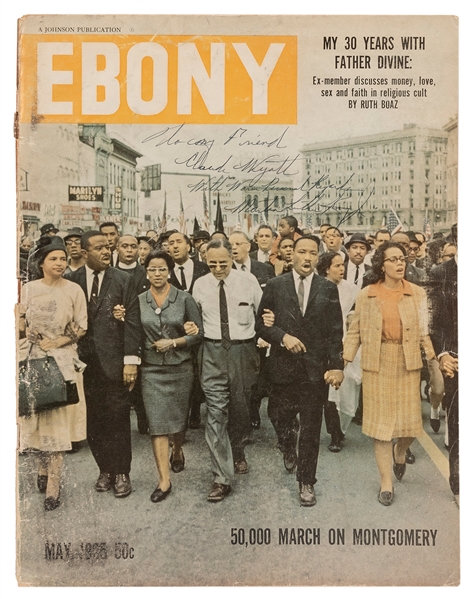
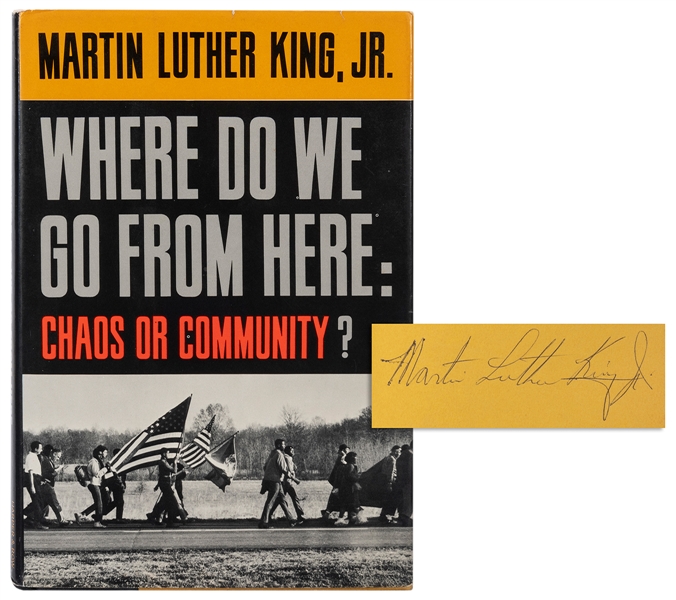
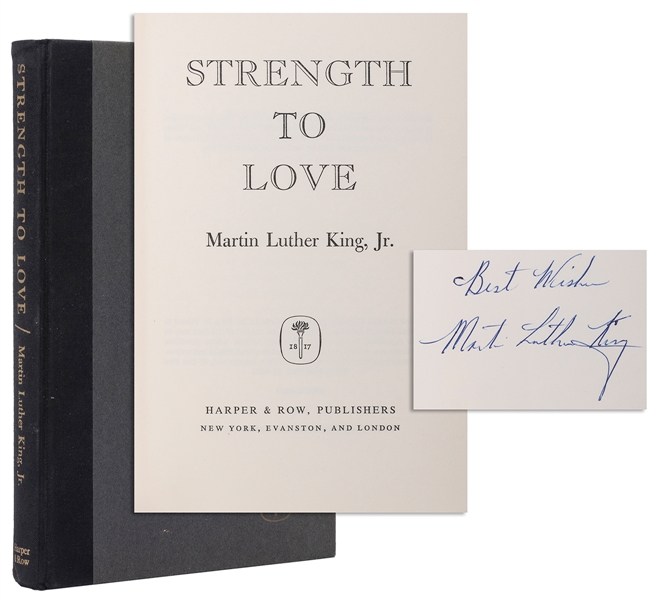
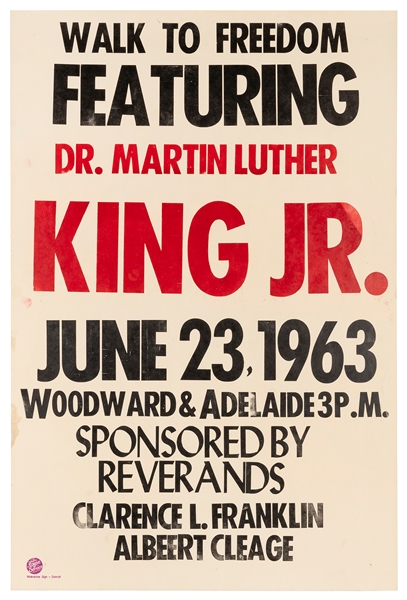
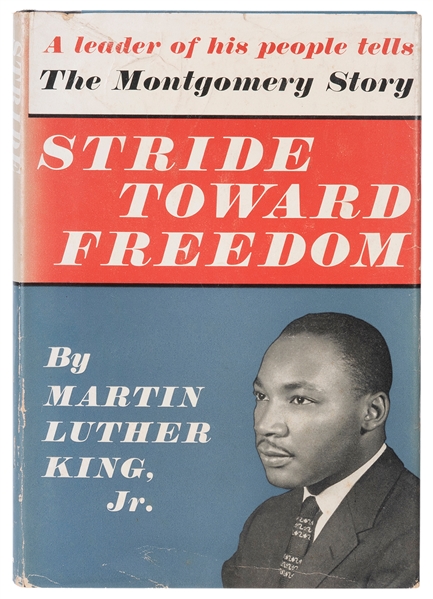

Testen Sie LotSearch und seine Premium-Features 7 Tage - ohne Kosten!
Lassen Sie sich automatisch über neue Objekte in kommenden Auktionen benachrichtigen.
Suchauftrag anlegen